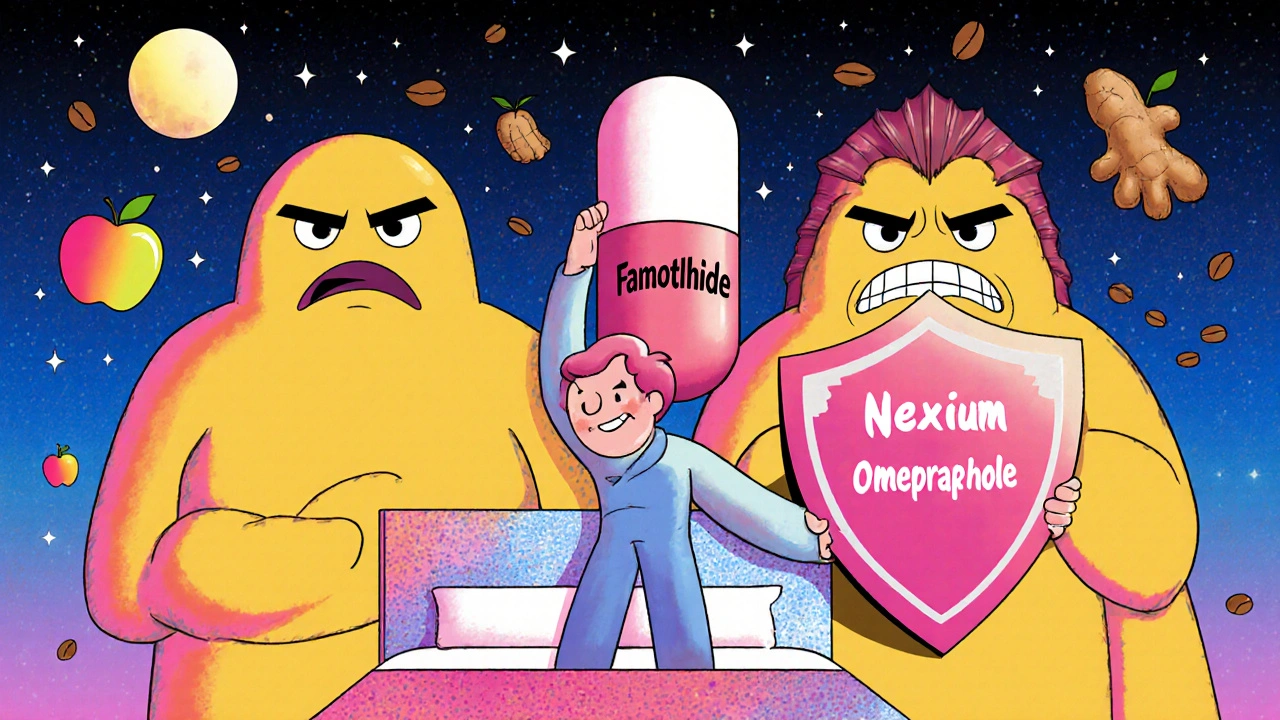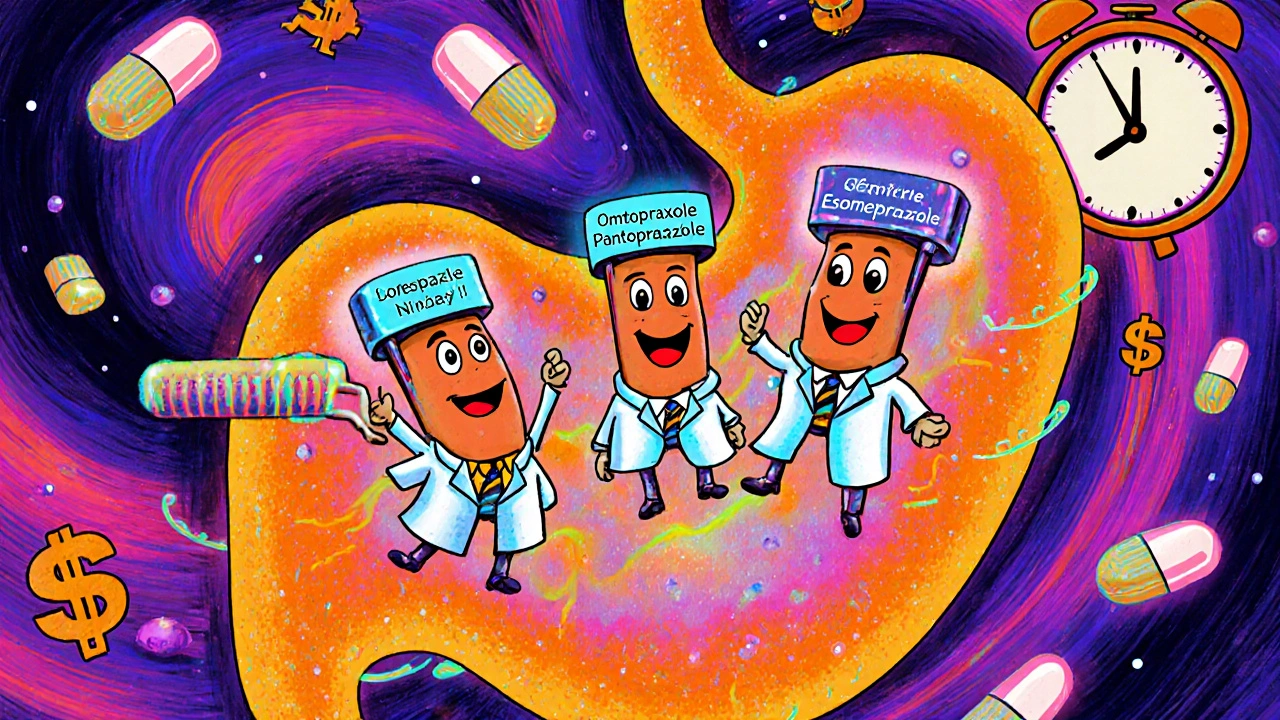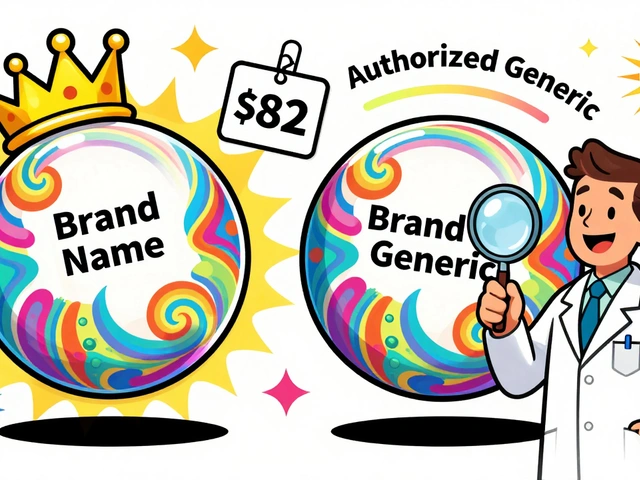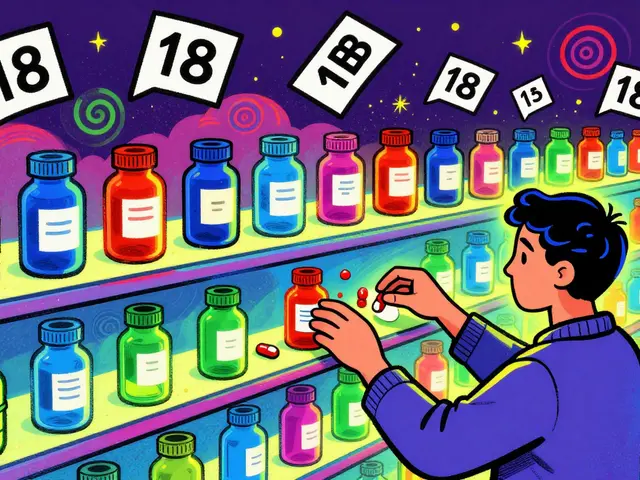Acid Reflux Treatment Decision Guide
Find Your Best Acid Reflux Treatment
Answer a few questions to get personalized recommendations based on the latest medical evidence.
Recommended Treatment
If you’ve been prescribed Nexium (esomeprazole) for heartburn or acid reflux, you’re not alone. Millions use it every day. But maybe you’re wondering: is there something cheaper? Safer? Better? Or maybe your insurance won’t cover it anymore, and you’re looking for options that actually work. This isn’t about switching for the sake of it-it’s about finding what fits your body, your budget, and your life.
What is Nexium (esomeprazole), really?
Nexium is the brand name for esomeprazole, a proton pump inhibitor (PPI). It works by shutting down the acid-producing pumps in your stomach lining. Less acid means less burning, less regurgitation, and fewer ulcers. It’s not a quick fix like Tums-it takes 1 to 4 days to build up full effect. Most people take it once a day, 30 to 60 minutes before breakfast.
It’s approved for:
- Gastroesophageal reflux disease (GERD)
- Healing erosive esophagitis
- Preventing NSAID-induced ulcers
- Zollinger-Ellison syndrome (a rare condition causing excess stomach acid)
Studies show esomeprazole reduces stomach acid by up to 90% in healthy adults. That’s more than older PPIs like omeprazole. But effectiveness isn’t the only thing that matters.
Generic esomeprazole: the direct alternative
The cheapest and closest alternative to Nexium is generic esomeprazole. It’s the exact same drug, made by different manufacturers. The FDA requires generics to be bioequivalent-meaning they work the same way, in the same amount of time, with the same safety profile.
Here’s the reality: in the UK, a 30-day supply of 20mg generic esomeprazole costs around £5 to £8 at most pharmacies. Nexium brand? Often £30 to £50. Same pills. Same active ingredient. Same results.
Many patients don’t know this. Pharmacies sometimes default to the brand unless you ask for the generic. If your doctor prescribed Nexium, ask: “Can I get the generic version?” You’ll save money without losing effectiveness.
Omeprazole: the older, well-tested option
Omeprazole is the original proton pump inhibitor. It came out in the 1980s and has been used by hundreds of millions worldwide. It’s available over the counter in the UK as Losec or generic omeprazole.
How does it compare to esomeprazole? A 2018 meta-analysis in the British Journal of Clinical Pharmacology found omeprazole and esomeprazole had nearly identical healing rates for erosive esophagitis after 8 weeks-93% vs. 94%. The difference? Omeprazole is about half the price.
Some people report omeprazole doesn’t work as well for them. That’s not uncommon. Everyone’s stomach reacts differently. But for most, omeprazole works just fine. If you’re on Nexium and doing okay, switching isn’t urgent. But if you’re paying extra for no real benefit, omeprazole is a smart choice.
Pantoprazole: the balanced choice
Pantoprazole (brand name Pantoloc) is another PPI, often used in Europe and the UK. It’s known for being gentler on the liver and having fewer drug interactions than esomeprazole.
Why does that matter? If you take blood thinners like warfarin, or antidepressants like citalopram, pantoprazole might be safer. Esomeprazole can interfere with how your body breaks down certain medications, increasing side effect risks. Pantoprazole doesn’t do that as much.
Studies show pantoprazole is slightly less potent at suppressing acid than esomeprazole-but still effective. For mild to moderate GERD, it’s often enough. It’s also available as a generic, costing around £6 for a month’s supply.
Rabeprazole: faster action, less data
Rabeprazole (brand name Pariet) is the newest of the common PPIs. It starts working faster-some people feel relief within an hour. That’s why it’s sometimes used for acute heartburn flare-ups.
But long-term data? Less than for omeprazole or esomeprazole. A 2020 review in Alimentary Pharmacology & Therapeutics noted rabeprazole was effective for short-term relief but had fewer studies on healing esophagitis over 12 weeks.
If you need quick relief and only use PPIs occasionally, rabeprazole could work. But if you’re on it daily for months or years, there’s more evidence supporting omeprazole or esomeprazole.

H2 blockers: when PPIs are too strong
Not everyone needs a PPI. If your symptoms are mild-maybe heartburn twice a week-you might do better with an H2 blocker.
These include:
- Famotidine (Pepcid)
- Ranitidine (Zantac)-withdrawn in the UK due to contamination concerns
- Cimetidine (Tagamet)
Famotidine reduces acid production but doesn’t shut it down completely like PPIs. It works faster-within 30 minutes-and lasts up to 12 hours. It’s available over the counter and costs less than £3 for a 30-day supply.
One study in the Journal of Clinical Gastroenterology found famotidine was just as effective as omeprazole for mild GERD in non-obese patients. It’s also safer for long-term use. No increased risk of bone fractures, kidney issues, or vitamin B12 deficiency-the risks tied to long-term PPI use.
Try this: if you only get heartburn after big meals or coffee, take famotidine 30 minutes before eating. You might not need a PPI at all.
Lifestyle changes: the hidden alternative
Medication isn’t the only tool. In fact, many people reduce or stop PPIs entirely by changing habits.
Here’s what actually works:
- Stop eating 3 hours before bed
- Avoid trigger foods: spicy dishes, chocolate, citrus, caffeine, alcohol
- Elevate the head of your bed by 6 to 8 inches
- Lose 5-10% of body weight if overweight
- Quit smoking
A 2023 trial in the European Journal of Gastroenterology followed 200 people with GERD who cut out triggers and lost weight. After 6 months, 62% no longer needed any acid-reducing medication. That’s not a miracle-it’s science.
Try a 2-week experiment: stop PPIs, avoid triggers, and sleep elevated. If symptoms improve, you may not need daily medication.
When to stick with Nexium
Not everyone should switch. You should stay on Nexium if:
- You have severe erosive esophagitis and need maximum acid control
- You’ve tried other PPIs and they didn’t work
- You have Zollinger-Ellison syndrome
- Your doctor prescribed it after testing and found it’s the only thing that helps you
There’s no shame in using Nexium if it’s working. But don’t assume it’s the only option. Many people stay on it longer than needed because they don’t know alternatives exist.
What about natural remedies?
Apple cider vinegar, aloe vera, ginger tea-these get promoted online. But there’s no solid evidence they reduce stomach acid like PPIs do.
Some people swear by them. That’s fine if they help. But don’t replace a proven treatment with a trend. If you’re using a natural remedy, track your symptoms. If heartburn returns, don’t delay seeing a doctor.

Long-term risks: what you need to know
All PPIs carry risks if used for more than a year:
- Lower magnesium levels (can cause muscle cramps or irregular heartbeat)
- Increased risk of bone fractures (especially in older adults)
- Higher chance of gut infections like C. diff
- Possible vitamin B12 or iron deficiency
These risks are small-but real. That’s why doctors recommend using the lowest effective dose for the shortest time possible.
If you’ve been on Nexium for 2+ years, talk to your doctor about tapering off. Don’t stop cold turkey. That can cause rebound acid hypersecretion-your stomach overproduces acid for weeks.
Instead, switch to an H2 blocker like famotidine, then reduce frequency gradually.
Final decision guide: what to choose
Here’s a simple way to pick:
| Your Situation | Best Option | Why |
|---|---|---|
| Need maximum acid control for severe GERD | Generic esomeprazole or Nexium | Strongest suppression, proven for healing |
| On a budget, mild symptoms | Generic omeprazole | Half the cost, same results for most |
| Taking other medications (blood thinners, antidepressants) | Pantoprazole | Lower interaction risk |
| Heartburn only 1-2 times a week | Famotidine (H2 blocker) | Fast, safe, no long-term risks |
| Want to stop medication | Lifestyle changes | 62% of people improved without drugs in one study |
Frequently Asked Questions
Is generic esomeprazole as good as Nexium?
Yes. Generic esomeprazole contains the exact same active ingredient as Nexium and must meet strict FDA and UK MHRA standards for effectiveness and safety. The only differences are in inactive ingredients like fillers or coatings-none of which affect how the drug works. Most people see identical results at a fraction of the cost.
Can I switch from Nexium to omeprazole safely?
Yes, but don’t switch abruptly. If you’ve been on Nexium daily for more than a few weeks, stop it and start omeprazole on the same day. You might feel more heartburn for the first 3-5 days as your body adjusts. This is normal. If symptoms don’t improve after a week, talk to your doctor. Most people transition without issues.
Are H2 blockers safer than PPIs for long-term use?
Generally, yes. H2 blockers like famotidine don’t carry the same long-term risks as PPIs-like bone fractures, kidney problems, or nutrient deficiencies. They’re ideal for occasional use or for people who need to stay on acid control for years. Many doctors now recommend H2 blockers as a first step for mild GERD before jumping to PPIs.
Why does my heartburn come back after stopping Nexium?
This is called rebound acid hypersecretion. When you stop a PPI suddenly, your stomach overcompensates by producing more acid than before. It usually lasts 2-8 weeks. To avoid this, taper off slowly: reduce from daily to every other day, then every third day, then switch to an H2 blocker like famotidine before stopping completely. Always consult your doctor before making changes.
Should I take Nexium if I’m over 65?
It depends. Older adults are more at risk for PPI side effects-like bone fractures, low magnesium, and pneumonia. If you’re over 65 and have mild GERD, start with lifestyle changes and famotidine. Only use a PPI like Nexium if absolutely necessary, and use the lowest dose for the shortest time. Ask your doctor about bone density tests and vitamin B12 levels if you’re on PPIs long-term.
Next steps
Don’t just keep taking Nexium because it’s what you were given. Ask yourself:
- Am I taking this daily, or only when needed?
- Could I try an H2 blocker or lifestyle changes first?
- Have I checked if generic esomeprazole is covered by my pharmacy?
- When was the last time I reviewed my medication with a doctor?
If you’re unsure, book a 15-minute chat with your pharmacist. They can explain your options, check for interactions, and help you save money. You don’t need to suffer-or overpay-for something that might not even be necessary anymore.





Melanie Taylor
November 16, 2025 AT 03:45Just switched from Nexium to generic omeprazole last month-same relief, $12 instead of $60. 🙌 Life-changing. Also started sleeping with pillows under my head-no more midnight burning. You don’t need a prescription to feel better.
Latrisha M.
November 16, 2025 AT 13:37This is one of the clearest, most practical guides I’ve read on PPI alternatives. Thank you for laying out the science without hype. Many people stay on Nexium out of habit, not need. The lifestyle section alone could save thousands from unnecessary medication.
Danish dan iwan Adventure
November 18, 2025 AT 04:43Given the pharmacokinetic profiles, esomeprazole’s S-enantiomer confers marginal CYP2C19 inhibition advantage over omeprazole, yet clinical outcomes are non-inferior. Cost-benefit analysis favors generics. H2 blockers remain underutilized for intermittent GERD. Rabeprazole’s faster onset is pharmacodynamically notable but lacks longitudinal validation.
Daniel Stewart
November 19, 2025 AT 01:56It’s ironic, isn’t it? We’re told to trust science, yet we pay $50 for a pill that’s chemically identical to one costing $5. The pharmaceutical industry doesn’t sell health-it sells dependency. And we, the consumers, keep buying the story.
Oyejobi Olufemi
November 19, 2025 AT 22:00Let me tell you something… you think it’s just about acid? No. It’s about your gut microbiome being destroyed by PPIs-your immune system weakened, your bones crumbling, your B12 vanishing… and you’re still taking it because you were told to? You’re being manipulated. Big Pharma doesn’t want you cured-they want you addicted. The truth? They know H2 blockers are safer. They just don’t profit from them.
Ankit Right-hand for this but 2 qty HK 21
November 20, 2025 AT 02:09Everyone’s so obsessed with generics. What about the fact that Nexium’s coating is engineered for delayed release? Generic versions? Sometimes they dissolve too fast. You think the FDA checks every batch? Ha. I’ve had generics that did nothing. Brand works. Pay the extra ten bucks. Your stomach doesn’t lie.
ZAK SCHADER
November 21, 2025 AT 08:14USA got the best meds in the world. Why you all switching to cheap junk? Nexium is science. Generic? Made in some lab in India with dirty water. You think your body won’t notice? You’re playing Russian roulette with your digestion. Stick with the real stuff. American made. Period.
David Rooksby
November 22, 2025 AT 20:15Okay, so here’s the real scoop no one’s telling you-PPIs are basically chemical mind control. They don’t just reduce acid, they rewire your stomach’s feedback loop so it forgets how to regulate itself. That’s why you get rebound acid when you quit-your stomach panics and goes full acid tsunami. And guess who’s selling you the ‘solution’? The same company that made the problem. They even trademarked the word ‘reflux’ to keep you hooked. I’ve got friends who’ve been on Nexium for 12 years. One of them had a kidney transplant last year. Coincidence? I think not. The FDA knows. The doctors know. But the marketing budget? That’s bigger than your pension.
Teresa Smith
November 23, 2025 AT 03:26What’s striking here isn’t the pharmacology-it’s the cultural surrender. We’ve outsourced our health to pills because we’ve lost the discipline to change. We’d rather swallow a daily tablet than stop eating at midnight or lose 10 pounds. The real alternative isn’t pantoprazole or famotidine-it’s personal responsibility. And that’s the hardest drug to take. But it’s the only one that heals. The rest just mask the symptom while the root festers.
Dan Angles
November 24, 2025 AT 18:17As a healthcare provider, I appreciate the evidence-based clarity of this post. Patients often assume brand-name medications are superior, despite overwhelming bioequivalence data. I routinely counsel on generic substitution and H2 blockers for intermittent symptoms. The lifestyle interventions-particularly sleep posture and meal timing-are underemphasized in clinical practice but demonstrably effective. I encourage all patients to undergo a 2-week trial of non-pharmacological management before initiating or continuing long-term PPI therapy. This is not merely cost-saving-it is risk-mitigation.